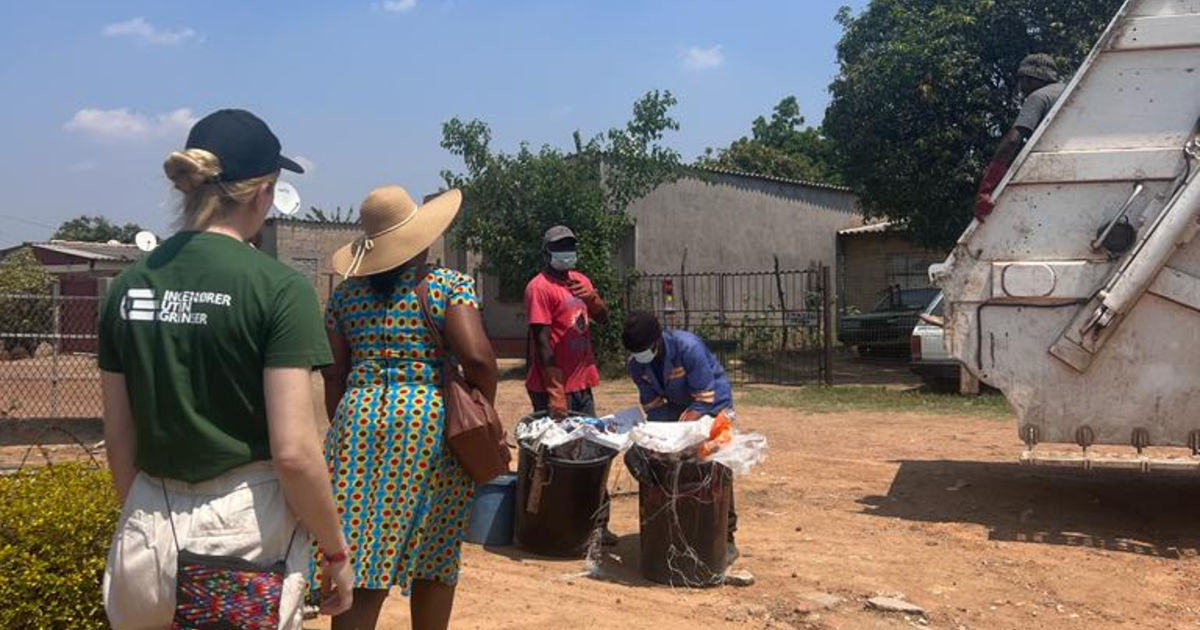Bakgrunn
Midland’s Children's Hope Project (MCHP) er en NGO i Mkoba, Gweru, som jobber for bærekraftige lokalsamfunn ved å investere i innbyggernes potensiale. De tilbyr lån til lokale familier for å starte egne bedrifter for å oppnå økonomisk selvstendighet. Lånene kan betales tilbake med kontanter eller ved å levere gjennomsiktige PET-flasker, som gir en reduksjon på 40 cent per kilo plast. Denne plasten selges deretter til et privat firma. MCHP planlegger også å etablere et samfunnssenter med en tilknyttet resirkuleringsstasjon.
Målet med resirkuleringsprosjektet er å forhindre at plastavfall havner i naturen, bidra til avfallshåndtering og skape økonomiske og sosiale fordeler for lokalsamfunnet.
Oppdraget
Målet med prosjektoppgaven var å utvikle en modell som viser de kvalitative og kvantitative strømmene av plastmaterialer i Gweru. Fokuset var å få en bedre forståelse av avfallssystemet i området og identifisere hvordan Hope Recycling Project kan integreres og ha en positiv effekt.
For å legge til rette for verdiskapning gjennom oppgaven, var det viktig å skape en nøyaktig modell av det eksisterende avfallshåndteringssystemet nær det planlagte samfunnssenteret. Det innebar å samle inn data om avfallsgenerering, håndteringsmetoder, både formelle og uformelle innsamlingsmetoder, samt drift av en Precious Plastic-maskin. Under feltbesøket til Gweru i oktober ble det gjennomført en rekke intervjuer med ulike aktører for å få innsikt i avfallssystemet og de generelle levekårene.
Videre ble det arrangert opplæringsøkter om resirkulering av plast og dets påvirkning på mennesker og miljø, samt besøk som viste MCHPs arbeid og ga innblikk i livet i Gweru.
Den fullstendige feltrapporten og prosjektoppgaven kan lastes ned fra menyen til høyre.
During the fall of 2023, NTNU-student Kim Kluin carried out her fieldwork at MCHP in Zimbabwe, in collaboration with her EWB mentor, Katrine O. Garnæs
Background
The Midland’s Children's Hope Project (MCHP), is an NGO operating in the township of Mkoba in the city of Gweru, which strives to build sustainable communities by investing in people's potential. As part of their ongoing initiatives, they provide local families with micro loans to establish businesses, ensuring financial independence. Repayment options for these loans include cash payments or the delivery of transparent PET bottles, which reduce the loan by 40 cents per kilogram of plastic. The collected plastic is subsequently sold to a private waste collection enterprise. Looking ahead, MCHP is planning to establish a community center, with a recycling station integrated.
The aim of the recycling project is to provide families supported by MCHP with the products they require most while turning plastic waste into a currency, and therefore
combatting the cash crisis in the area. Not only is this project expected to help avoid plastic waste ending up in the nature, but also create economic opportunities for the community as well as other social benefits.
The assignment
The objective of the project work was to create a model depicting qualitative and quantitative plastic material flows in the city of Gweru, Zimbabwe.
The focus was understanding the waste system in the region and narrow down the potential role that the Hope Recycling Project could play in this system when scaled to the extent envisioned by MCHP.
To ensure the project work adds value to the recycling initiative, an accurate model of the current waste management system in the vicinity of the planned community center was necessary. Data on waste generation, disposal procedures, formal and informal waste collection, and the Precious Plastic machine's operation, was collected in order to create the model. Multiple stakeholders were interviewed during the field trip to Gweru in October 2023, in order to understand the waste system and general living conditions.
In addition to the interviews, they conducted educational sessions specifically on recycling plastic and its impact on humans and the environment, along with other visits to MCHP, highlighting their work and the living conditions in Gweru.
The full assignment report and project work can be downloaded from the menu on the right.


